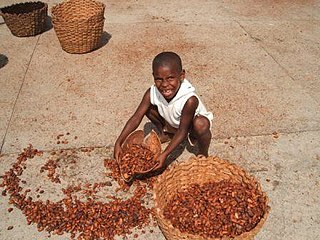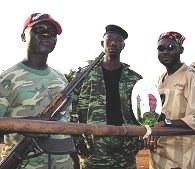
Ivory Coast, also known as Côte d'Ivoire and officially the Republic of Côte d'Ivoire, is a country on the southern coast of West Africa. Its capital city of Yamoussoukro is located in the centre of the country, while its largest city and economic centre is the port city of Abidjan. It borders Guinea to the northwest, Liberia to the west, Mali to the northwest, Burkina Faso to the northeast, Ghana to the east, and the Atlantic Ocean's Gulf of Guinea to the south. With 31.5 million inhabitants in 2024, Ivory Coast is the third-most populous country in West Africa. Its official language is French, and indigenous languages are also widely used, including Bété, Baoulé, Dyula, Dan, Anyin, and Cebaara Senufo. In total, there are around 78 languages spoken in Ivory Coast. The country has a religiously diverse population, including numerous followers of Islam, Christianity, and traditional faiths often entailing animism.

The Harkin–Engel Protocol, sometimes referred to as the Cocoa Protocol, is an international agreement aimed at ending the worst forms of child labor and forced labor in the production of cocoa, the main ingredient in chocolate. The protocol was negotiated by U.S. Senator Tom Harkin and U.S. Representative Eliot Engel in response to a documentary and multiple articles in 2000 and 2001 reporting widespread child slavery and child trafficking in the production of cocoa. The protocol was signed in September 2001. Joint Statements in 2001, 2005 and 2008 and a Joint Declaration in 2010 extended the commitment to address the problem.

Child labour is a recurring issue in cocoa production. Ivory Coast and Ghana, together produce nearly 60% of the world's cocoa each year. During the 2018/19 cocoa-growing season, research commissioned by the U.S. Department of Labor was conducted by NORC at the University of Chicago in these two countries and found that 1.48 million children are engaged in hazardous work on cocoa farms including working with sharp tools and agricultural chemicals and carrying heavy loads. That number of children is significant, representing 43 percent of all children living in agricultural households in cocoa growing areas. During the same period cocoa production in Cote d’Ivoire and Ghana increased 62 percent while the prevalence of child labour in cocoa production among all agricultural households increased 14 percentage points. Attention on this subject has focused on West Africa, which collectively supplies 69% of the world's cocoa, and Côte d'Ivoire, supplying 35%, in particular.

On Red Hand Day or the International Day against the Use of Child Soldiers in February 12th each year since 2002, pleas are made to political leaders and events are staged around the world to draw attention to child soldiers: children under the age of 18 who participate in military organizations of all kinds. Red Hand Day aims to call for action to stop this practice, and support children affected by it.

The Forces Nouvelles de Côte d'Ivoire is a political coalition that was formed in December 2002, in the wake of the first peace accords of the Ivorian Civil War.
The Inter-African Committee on Traditional Practices Affecting the Health of Women and Children(IAC) (French: Comité interafricain sur les pratiques traditionnelles affectant la santé des femmes et des enfants) is a non-governmental organization (NGO) which seeks to change social values and raise consciousness towards eliminating female genital mutilation (FGM) and other traditional practices which affect the health of women and children in Africa.
Abou Nidal de Genève is the stage name of Aboubakar Doumbia born on December 29, 1974, in Divo, Ivorian composer, performer and producer. His pseudonym is linked to the fact that he lived for many years in Geneva, Switzerland. His nickname is also Wara Boss in reference to the Wara Tour.

United Nations Security Council resolution 1479, adopted unanimously on 13 May 2003, after reaffirming Resolution 1464 (2003) on the situation in Côte d'Ivoire and resolutions 1460 (2003) and 1467 (2003), the council established the United Nations Mission in Côte d'Ivoire (MINUCI) after determining the situation in the country to be a threat to international peace and security in the region.

Dominique Claudine Nouvian Ouattara is the current First Lady of Ivory Coast, married to President Alassane Ouattara.
The CIFAD is a private institution in West Africa whose headquarters are in the district of Cocody in Abidjan, the economic capital of Côte d'Ivoire.

The 2023 Africa Cup of Nations, known in short as the 2023 AFCON or CAN 2023 and for sponsorship purposes as the TotalEnergies 2023 Africa Cup of Nations, was the 34th edition of the biennial Africa Cup of Nations tournament organised by the Confederation of African Football (CAF). It was hosted by Ivory Coast, taking place in the country for the second time following the 1984 edition.

Sidiki Kaba is a Senegalese politician who served as the 15th Prime Minister of Senegal from 6 March 2024 to 3 April 2024.
Child labour laws are statutes placing restrictions and regulations on the work of minors.

The International Cocoa Initiative (ICI) is a Geneva-based nonprofit funded by major chocolate makers that focuses on addressing child labour in cocoa production in West Africa. ICI works with communities, farmers, unions, the cocoa and chocolate industry, civil society and national governments in cocoa-producing countries to improve the lives of children involved in cocoa production. The secretariat of the International Cocoa Initiative is in Geneva, Switzerland. The organisation has two national offices in Abidjan and Accra.
Ivory Coast is a sub-Saharan nation in West Africa. It is a representative presidential democracy where rights are protected in the constitution, international law, and common law. As a member of the African Commission on Human and Peoples' Rights, it is a party to the African Charter on Human and Peoples' Rights and a signatory to major international human-rights agreements. In 2011, the Second Ivorian Civil War saw increases in violence and human-rights abuses. Although progress has been made towards reconciliation, the trial of former first lady Simone Gbagbo suggests that the root causes have not been addressed; no one has been convicted of crimes against humanity. According to a 2018 Human Rights Watch report, "Ongoing indiscipline by members of the security services and violent army mutinies demonstrated the precariousness of the country’s newfound stability."

Crime in Côte d'Ivoire is prevalent and versatile across the West African country. The most common forms of crime include child labour, arms trafficking, terrorism and human rights abuse. Other less common, but still evident types of crime include cannabis and synthetic drug trade, sex trafficking, fauna and flora crimes, cybercrime.
The Association des Femmes Ivoiriennes (AFI) or Association of Ivorian Women is a women's organization in the Ivory Coast, the women's wing of the Democratic Party of Ivory Coast (PDCI).
In this article, NGOs in West Africa will be divided into three categories: African national NGOs, African international NGOs, and non-African international NGOs. NGOs stand for non-governmental organizations. These organizations are mostly non-profit and mostly work independently from the government, they have specific aims that range from human rights, finance, health, education and more. There are many non-governmental organizations in West Africa, and much activity between these countries, organizations and the rest of the world.








